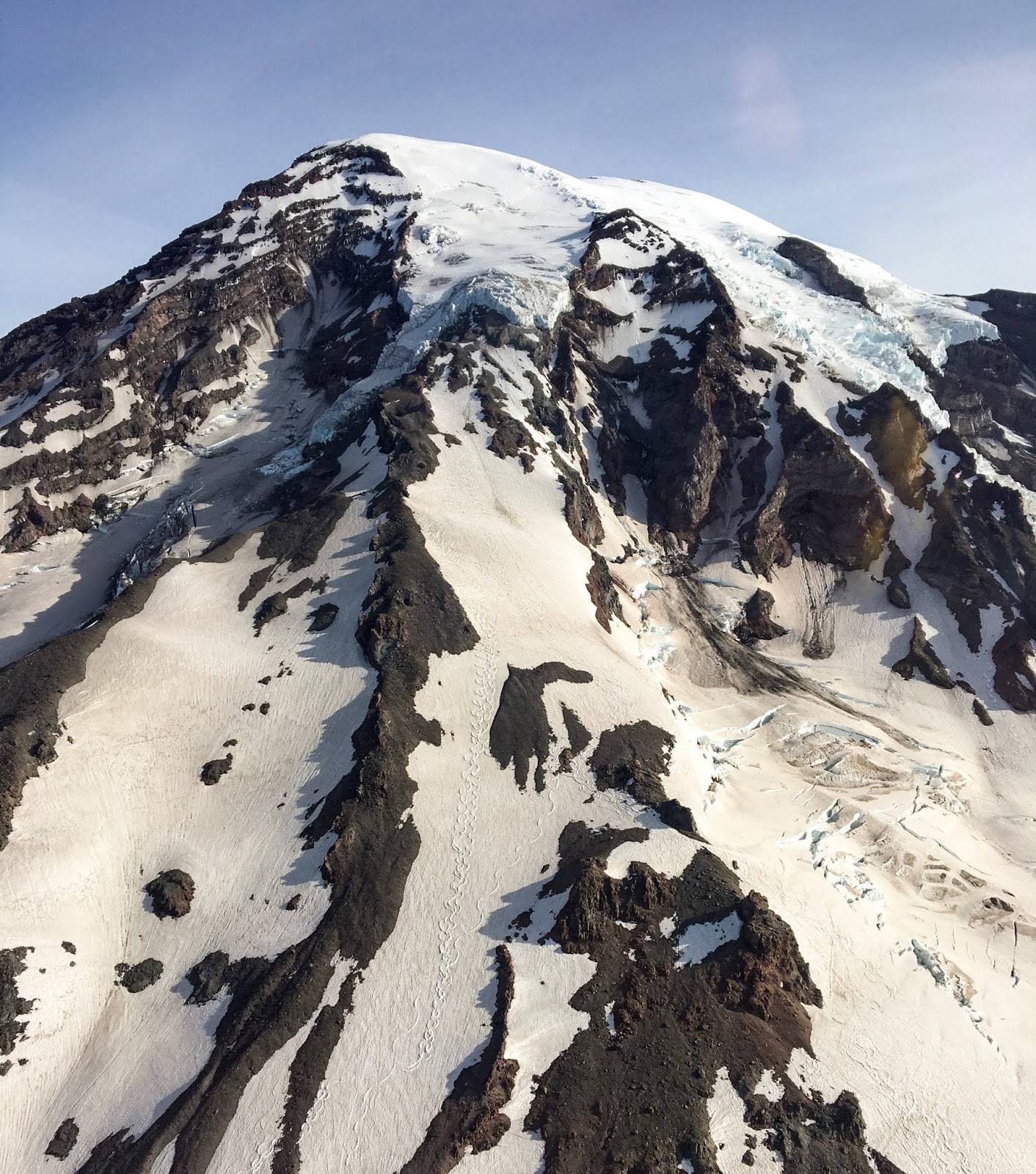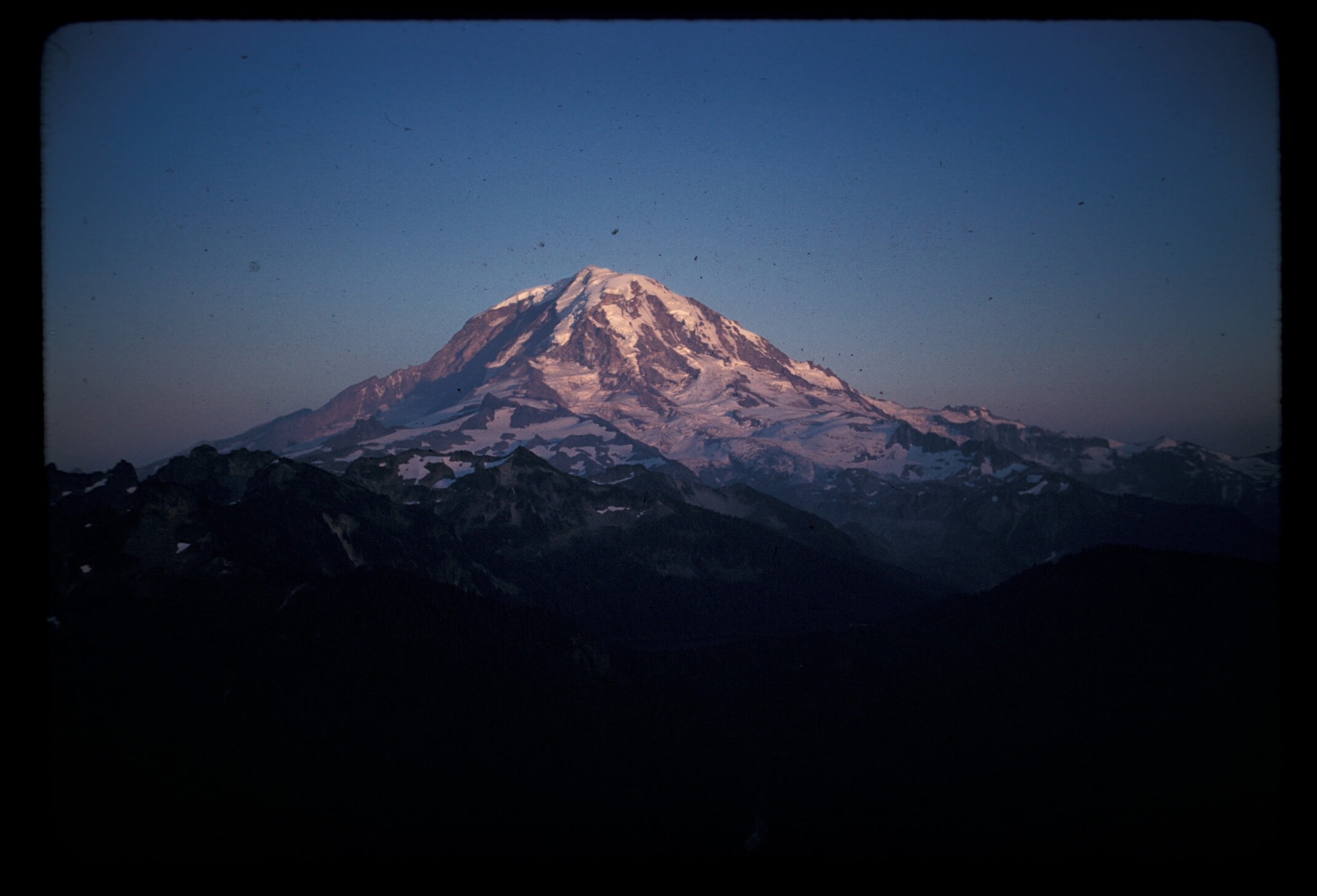
Before we get into the core (pun intended) of this topic, let’s quickly dive into a little science 101 on what exactly a glacier is and how it forms.
What is a glacier and how does it form? A glacier is a large body of densely compacted snow, ice, and ground deposits that accumulate over time under ideal conditions (consistent heavy snowfall that exceeds the melting rate over years and decades). Due to the force of gravity and its own volume, it meanders down the slope slowly chiseling away and carving out the surrounding landscape.
Now that we have a better understanding of what a glacier is and how it forms, let’s next move into what sets up the perfect scenario for a robust and active glacial system.
- The first reason is latitude. Typically, as you move north along the Pacific Northwest, the more likely glaciers can thrive and sustain themselves.
- The second reason is the position of the mountain along the Cascade crest. This precise position intercepts cool moisture-laden air coming off the Pacific Ocean.
- The third reason is the elevation. Precipitation in the form of snowfall tends to ramp up as you increase in elevation.
The stratovolcano that meets these criteria exceptionally well is Mt. Rainier (Tahoma). It is positioned on the crest of the Central Cascades in Washington at 14, 410 ft (4,392 m) in height. This massive mountain holds the most glacial ice from a volume standpoint in the lower 48 of the United States (Tucker, Dave, 2015).
Mt. Rainier embodies 25 active glaciers and numerous snowfields.
To drive home how robust Rainier’s glacial system is, did you know that Mt, Rainier has approximately 5 to 6 times more ice/snow compared to all other Cascade volcanoes combined (USGS, 2022), which is around 155 billion cubic feet of ice locked up on Mt. Rainier.
Other notable peaks like Mt. Hood (Wy’East) hold around 12 billion cubic feet of ice. The Three Sisters region (Klah Klahne) holds approximately 5 to 6 billion cubic feet of ice (Harris, S. L, 2006).
Mt Rainier’s glaciers are feeling the negative impacts of climate change. Therefore, you can expect the 155 billion cubic feet of ice to potentially be even less today.

I hope this fascinating insight about Mt. Rainier’s glacial system evokes curiosity and wonder in you to explore this spectacular mountain in this ever-changing world we live in right now. I will leave you with this quote that truly sums up the essence of Mt. Rainier (Tahoma).
“Of all the fire mountains which like beacons, once blazed along the Pacific Coast, Mount Rainier is the noblest.” – John Muir
Sources:
- Harris, S. L. (2006). Fire mountains of the west: The Cascade and Mono Lake Volcanoes (3rd ed.). Mountain Press Publishing Co.
- Tucker, David. Geology Underfoot in Western Washington. 2015
- Which mountain in the conterminous U.S. has the most glaciers? (no date) Which mountain in the conterminous U.S. has the most glaciers? | U.S. Geological Survey. Available at: https://www.usgs.gov/faqs/which-mountain-conterminous-us-has-most-glaciers#:~:text=Mount%20Rainier%2C%20Washington%2C%20at%2014%2C410,Rainier%20has%20approximately%2026%20glaciers. (Accessed: December 10, 2022.
Hi Debra,
This research is as current and accurate as I could find. This is also why my last sentence mentions how there is a strong chance there is less than 155 billion cubic feet of ice remaining. I do know that 2021 summer heat wave had a negative impact on many of the active Cascade glaciers.
I would explore the nps.gov and and other monitoring programs that study the glacial system at Mt. Rainier if you are curious to know where it currently stands. I hope that helps. I’m curious to know what you find 🙂 Happy New Year!
How current is your research? I would really like to know the impact on the Rainier glaciers of the 2021 early summer heat wave in the area. The mountain really looked different (much less snow/ice) for the remainder of that summer.
You betcha and thank you! Glad you gained a lot of insight from this read!
Indeed. So interesting isn’t it?! Glad you really enjoyed it! Cheers! 🙂
Squaw was never a native American word: FACT
Palisade walls are series of high, stout, pointed stakes in close proximity meant protect those behind the WALL and keep others out: FACT
When the Ski area becomes overpriced and only for the elite, maybe then you will begin to see why they are planning on building a WALL of STAKES or PALISADES around the VILLAGE. Starting to sound familiar yet?
You have all been played
Hi Dinner Roll (PS one of my favorite foods),
What do you think came 1st? The naming of the cliffs at Squaw or the forts that helped conquer the Indians?
Maybe the word Palisade reminds the Natives about the time their ancestors spent in prison or the conquering settlers who pushed them off their land and used Palisade forts to protect themselves from Native attacks. Anyways…. as stated before the woke joke CA folk have no rhyme or reason to their sensitivities. Their logic is crumbling like public safety and real estate values in SF.
The word Palisade is likely equally offensive as the word Squaw. How in their supreme woke-ness did they not think of that? I’m sure I can round up some of the local tribes to put out a press announcement to the effect. That would be hilarious to see Squaw go through a 2nd round of name changes.
AnOnYmOuS – CA Sucks- “Palisades” is probably named after the famous PALISADES at the ski area. The fort designed was named after the similar looking cliff formations, not the other way around.
Palisade forts were used to occupy and conquer Indian Tribes.
It makes me happy the woke powderpuffs at Squaw CALIFORNIA didn’t google the definition of Palisade before making their fee fees feel better. It just highlights how unintelligent and heard-like sheep they really are.
I appreciate the inclusion of the tribal names of these peaks. It’s cool to know what different names these awesome peaks have been called over the years.
This is incredible stuff! Mount Rainier (Tahoma) holds a significant amount of the total glacial ice in the entire lower 48, really hard stuff to wrap your head around! Thanks for the awesome write up and also including the Indigenous names, of which I was ignorant before today.
Cheers
Another person practicing stupid to be politically correct. I had to leave California because of that problem. Squaw Valley is now Palisades. One hundred years of history now denied because somebody’s feelings got hurt. I really like your attitude Danny
What’s with the Indian name references? Is that your subtle way of trying to suggest that we should use different names for American territory points of interest? It’s disgusting behavior, myopic, anti patriotic to use dialogue that does not represent majority views of how citizens here feel. You act as if nobody lived in the American territory before Indian tribes, you do realize written history is only 7000 years old right? Anything before that is speculation, prehistory. So essentially your limited view on how the world works stops your brain from realizing that every “tribe” over time succeeds a prior one, implementing their own language, values, and societal practices. Lol Indians probably slaughtered the people before them and with the name of Mt Rainier changing multiple(s) times over the hundred of thousands of years humans have been alive. But that doesn’t matter to you because murder and death is apparently trivial after a few thousand years. This is why your use of Indian language is myopic and arbitrary. Think big picture please.